The miniplate for bone fixation market is forecast to grow from USD 162.2 million in 2025 to USD 251.9 million by 2035, with a CAGR of 4.5%. This growth is driven by the increasing need for bone fixation procedures in orthopedic surgery, particularly in the treatment of fractures and bone deformities. Miniplates are commonly used for bone stabilization due to their effectiveness in small bone fractures and maxillofacial surgery. As the global population ages, demand for orthopedic procedures, including bone fixation, will continue to rise, driving market growth.
Technological advancements in implant materials and biocompatibility will also play a significant role in boosting demand. Furthermore, the increasing adoption of minimally invasive surgical techniques will contribute to market growth, as they offer quicker recovery times and reduced complications. The market is also benefiting from advances in product design and customization, delivering better results and improving patient outcomes. With expanding healthcare infrastructure and increased access to advanced orthopedic care in emerging markets, the demand for miniplates for bone fixation will remain strong through 2035.
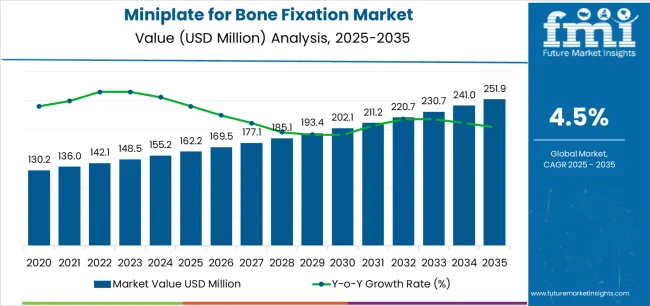
From 2025 to 2030, the market is expected to grow from USD 162.2 million to USD 202.1 million, adding USD 39.9 million. This growth will be driven by advancements in surgical techniques and the rising demand for bone fixation solutions, particularly in the growing orthopedic and maxillofacial surgery sectors. The continued development of more efficient and precise miniplates will also support this trend, making them a preferred choice for treating small bone fractures.
Between 2030 and 2035, the market is forecast to expand from USD 202.1 million to USD 251.9 million, contributing USD 49.8 million to the overall market value. This phase will see sustained growth driven by the rising adoption of minimally invasive surgery and customized fixation solutions. With growing healthcare investments in emerging markets and an increasing focus on improving patient recovery times, the demand for high-quality bone fixation products like miniplates will continue to rise, securing steady market expansion through 2035.
| Metric | Value |
|---|---|
| Market Value (2025) | USD 379 million |
| Market Forecast Value (2035) | USD 666 million |
| Forecast CAGR (2025-2035) | 5.8% |
The miniplate for bone fixation market is growing due to several key factors, including the increasing demand for minimally invasive surgical procedures, the rising prevalence of bone fractures and trauma-related injuries, and advances in surgical techniques. Miniplates, made from biocompatible materials like titanium and stainless steel, offer excellent strength, durability, and resistance to corrosion, making them ideal for bone fixation in craniomaxillofacial, orthopedic, and neurosurgical applications. The demand for miniplates is significantly driven by the rising global incidence of bone fractures, especially in elderly populations, where fractures are more common due to osteoporosis and age-related conditions.
The growing trend of minimally invasive surgeries is fueling the demand for small, lightweight implants such as miniplates, which promote faster recovery, reduced scarring, and shorter hospital stays compared to traditional open surgeries. The automotive industry, with its increasing emphasis on safety and comfort, also drives the demand for miniplates used in treating trauma injuries resulting from vehicle accidents. Additionally, the increasing use of 3D printing and customizable implants in surgical procedures has expanded the potential for personalized miniplates that cater to the specific needs of patients, enhancing surgical outcomes and patient satisfaction.
Growing access to healthcare in emerging markets, along with technological advancements in surgical techniques and implant manufacturing, is further accelerating the adoption of miniplates. This has led to a steady rise in the market’s demand, especially in regions like Asia Pacific, where rapid urbanization and healthcare improvements are fostering greater adoption.
The miniplate for bone fixation market is primarily segmented by plate type and application. By plate type, the market is divided into L-type, T-type, Y-type, and other types, with the L-type segment holding the largest share. L-type plates are widely used in craniomaxillofacial surgery and hand surgeries due to their excellent stability and support for bone fixation. By application, the market is segmented into craniomaxillofacial surgery, neurosurgery, hand surgery, and others, with the craniomaxillofacial surgery segment leading due to the increasing incidence of facial fractures and the rise in minimally invasive procedures. Regions like China, India, and Germany are the largest contributors to the market due to strong demand from their healthcare systems and advanced surgical techniques, while the U.S. and U.K. maintain steady growth driven by advanced medical infrastructure.
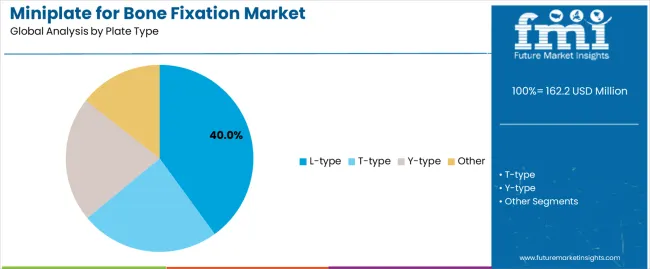
The L-type plate is the dominant segment in the miniplate for bone fixation market, holding approximately 40% of the total market share. L-type plates are favored due to their superior versatility, ease of application, and effectiveness in bone fixation during craniomaxillofacial and hand surgeries. Their design ensures stable bone alignment, which is essential for achieving optimal recovery outcomes, particularly in facial fractures and jaw reconstruction surgeries.
The increasing trend toward minimally invasive procedures further boosts the demand for L-type miniplates, as they can be used in small, targeted incisions, reducing the risk of complications and improving recovery times for patients. The biocompatibility and durability of titanium-based L-type plates make them ideal for long-term implantation, providing consistent strength and resistance to corrosion. As surgeons continue to favor minimally invasive techniques, the L-type plate is projected to maintain its dominance in the market, as it offers the right combination of strength, adaptability, and ease of use in various surgical specialties.
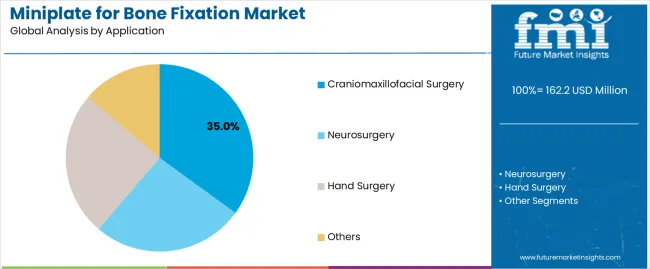
The craniomaxillofacial surgery segment holds the largest share in the miniplate for bone fixation market, capturing around 35% of the market share. This is due to the growing number of facial trauma cases, accidents, and cosmetic reconstructive procedures that require precision in bone fixation. Miniplates are particularly beneficial in craniomaxillofacial surgeries as they provide stability, strength, and adaptability when treating fractures in the facial bones, such as the jaw, cheekbones, and eye sockets. The increasing trend toward minimally invasive procedures is also driving growth in this segment, as miniplates can be implanted with smaller incisions, reducing recovery time and complications for patients.
Additionally, the growing demand for aesthetic and functional restoration of facial features, especially in the wake of traumatic injuries or congenital defects, is further boosting the adoption of miniplates in craniomaxillofacial procedures. The segment is also benefiting from technological innovations, such as the ability to create customized miniplates tailored to an individual’s unique bone structure, enhancing surgical outcomes. As the prevalence of facial trauma and reconstructive surgery rises, craniomaxillofacial surgery is expected to continue to dominate the market, driving the demand for miniplates.
The miniplate for bone fixation market is primarily driven by the increasing prevalence of bone fractures, rising demand for minimally invasive surgeries, and technological advancements in implant materials. The aging population, along with a rise in trauma-related injuries, has led to greater need for bone fixation solutions. The growing emphasis on biocompatible, lightweight, and customizable implants further fuels the market. However, the market faces challenges due to high costs and the complexity of certain surgical procedures. Despite these hurdles, trends like 3D printing and increasing healthcare access in emerging economies are supporting growth.
What are the key drivers of the miniplate for bone fixation market?
The growth of the miniplate for bone fixation market is driven by several key factors. The increasing global incidence of bone fractures due to trauma, sports injuries, and aging populations has escalated the demand for effective fixation solutions. Additionally, minimally invasive surgery techniques are gaining popularity, as they offer shorter recovery times and reduced complication risks, driving the demand for miniplates. The availability of biocompatible materials such as titanium and bioabsorbable polymers has enhanced the appeal of miniplates in a variety of orthopedic, neurosurgical, and craniomaxillofacial procedures. These factors are expected to fuel continued market expansion.
What are the key restraints in the miniplate for bone fixation market?
Despite strong growth, the miniplate for bone fixation market faces several challenges. High production costs, especially for advanced materials like titanium and bioabsorbable polymers, can hinder affordability, especially in emerging markets where cost-sensitive options are preferred. Furthermore, the complexity of certain procedures requiring miniplates means that specialized surgeons and advanced facilities are necessary, limiting widespread adoption. Complications such as implant rejection, infection, and plate misalignment may also pose risks, making healthcare providers cautious about widespread implementation, especially in underdeveloped regions.
What are the key trends in the miniplate for bone fixation market?
Several key trends are shaping the miniplate for bone fixation market. The growing adoption of 3D printing technology enables the creation of personalized implants, which cater to individual patient needs and improve surgical outcomes. Sustainable materials, such as biodegradable and recyclable implants, are gaining popularity due to increasing concerns about the environmental impact of medical devices. Additionally, advances in minimally invasive surgical techniques continue to drive demand for small, lightweight bone fixation solutions. The expansion of healthcare access in emerging markets is also contributing to the widespread adoption of miniplates, further supporting market growth.
The miniplate for bone fixation market is experiencing growth across various countries, driven by factors such as healthcare access, increasing trauma-related injuries, and rising demand for advanced surgical solutions. Countries like China, India, and Germany are leading the market due to their strong healthcare systems and rising numbers of surgical procedures. The U.S. and U.K. are mature markets, exhibiting steady demand due to their well-established medical infrastructure and focus on high-quality bone fixation solutions. Meanwhile, regions like Brazil and Japan are also showing promising growth potential as healthcare access improves and surgical demand rises.
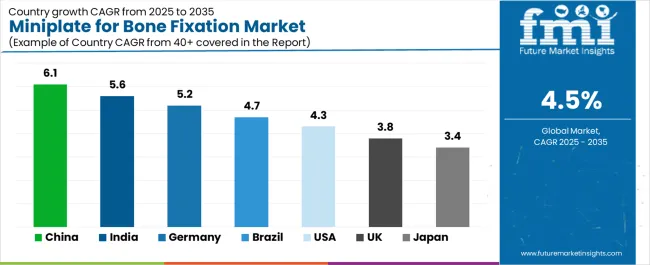
| Country | CAGR (%) |
|---|---|
| China | 6.1 |
| India | 5.6 |
| Germany | 5.2 |
| Brazil | 4.7 |
| U.S. | 4.3 |
| U.K. | 3.8 |
| Japan | 3.4 |
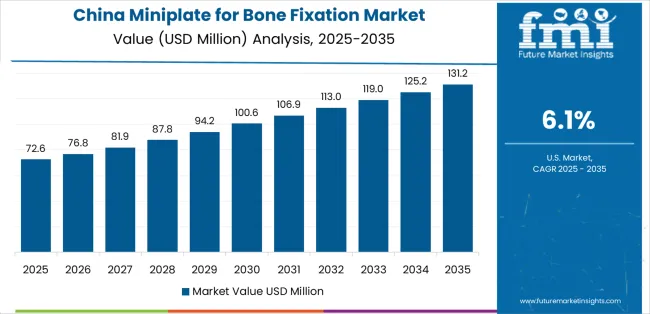
China is expected to grow at a strong CAGR of 6.1% in the miniplate for bone fixation market, driven by its expanding healthcare infrastructure and increasing trauma-related injuries. The demand for bone fixation devices is particularly high in craniomaxillofacial and orthopedic surgeries, as China has a growing elderly population and a rise in traffic accidents. The Chinese government has been heavily investing in the modernization of healthcare facilities, improving access to advanced medical technologies. With a focus on affordable healthcare solutions, local manufacturers are also boosting the availability of miniplates made from biocompatible materials, making the devices more accessible across the country. As more people gain access to specialized medical treatments, the demand for miniplates is expected to rise significantly in the coming years.
India is projected to grow at a CAGR of 5.6%, fueled by an increasing demand for high-performance surgical implants in both the public and private healthcare sectors. The rise in trauma-related injuries and fractures, coupled with an aging population, is driving the demand for miniplates for bone fixation in craniomaxillofacial and orthopedic surgeries. India's expanding healthcare access, particularly in rural areas, is also contributing to the widespread adoption of advanced surgical solutions like miniplates. Furthermore, India's strong medical tourism sector, where trauma care and cosmetic surgery services are sought after, further fuels the demand for these implants. As the country continues to improve its healthcare infrastructure and the adoption of minimally invasive procedures increases, India's market for miniplates will see consistent growth in the coming years.
Germany is expected to experience a CAGR of 5.2% in the miniplate for bone fixation market, benefiting from its strong healthcare infrastructure and advanced surgical techniques. Known for its innovation in medical technology, Germany leads the European market with a high adoption rate of minimally invasive surgeries in orthopedic and craniomaxillofacial procedures. The country’s well-established research and development ecosystem in the medical sector has led to the creation of high-quality, durable bone fixation devices, including miniplates made from titanium and other biocompatible materials. Additionally, Germany’s aging population, coupled with a growing demand for trauma care, further contributes to the sustained demand for miniplates. Germany's commitment to sustainability and recyclable medical solutions ensures the continued growth of the market, as the focus on eco-friendly medical devices gains momentum.
Brazil is forecasted to grow at a CAGR of 4.7%, with the rise in trauma care and surgical procedures driving demand for miniplates in bone fixation surgeries. The country’s healthcare system is rapidly improving, with both public and private sectors investing in advanced medical technologies. Brazil’s increasing number of road accidents and sports injuries further drives the demand for bone fixation devices, including miniplates, which provide effective and durable solutions. Additionally, Brazil's growing middle class and expanding access to healthcare services are contributing to the wider use of high-quality bone fixation devices. As healthcare modernization continues, Brazil is expected to see steady growth in its demand for miniplates.
The U.S. is expected to grow at a CAGR of 4.3%, driven by its well-established healthcare system and high levels of medical device adoption. The country’s strong demand for minimally invasive surgical procedures has led to an increase in the use of miniplates, especially for craniomaxillofacial and neurosurgical procedures. The U.S. is a leader in medical innovation, with advancements in biocompatible materials, implant design, and 3D printing technologies supporting the creation of personalized implants for patients. Additionally, the high incidence of trauma-related injuries and sports injuries continues to drive the demand for bone fixation devices like miniplates. With a growing focus on patient outcomes, the U.S. market for miniplates is expected to maintain steady growth over the forecast period.
The U.K. is expected to grow at a CAGR of 3.8%, driven by the country’s strong healthcare infrastructure, advanced surgical practices, and rising demand for minimally invasive techniques. The increasing need for bone fixation solutions in craniomaxillofacial surgeries, especially with trauma-related facial fractures and reconstructive procedures, is fueling the market. The U.K.'s focus on personalized medicine and patient-centric approaches further contributes to the adoption of customized miniplates tailored to individual patient needs. Additionally, the U.K.’s aging population and the rising number of trauma and sports injuries are expected to drive consistent demand for miniplates in orthopedic surgeries. As the country continues to invest in healthcare innovation, the demand for advanced bone fixation devices is set to rise steadily.
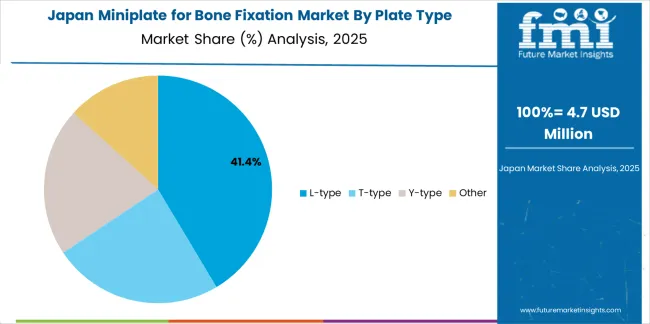
Japan is projected to grow at a CAGR of 3.4% in the miniplate for bone fixation market, supported by its highly advanced healthcare system and increasing demand for minimally invasive surgical solutions. Japan’s aging population, along with the rise in trauma cases and degenerative bone diseases, is contributing to the market's steady growth. Japan has also seen an increase in cosmetic and reconstructive surgeries, where miniplates play a crucial role in facial bone repair and jaw reconstruction. The country’s focus on biocompatible and long-lasting materials, along with technological advancements in medical devices, ensures the continued adoption of miniplates in surgical procedures. While Japan’s growth is slower compared to other regions, its market remains strong due to its commitment to medical excellence and innovation.
The miniplate for bone fixation market is competitive, with both global leaders and regional players vying for market share. Stryker, holding approximately 10% of the market share, is a dominant player, offering a wide range of high-quality miniplates for trauma care and craniomaxillofacial surgeries. Other key players such as Smith & Nephew, Zimmer Biomet, and Medtronic are also leading the market by offering advanced bone fixation solutions. These companies are focused on continuous innovation, investing in biocompatible materials, 3D printing, and personalized surgical implants to maintain their competitive edge in the market.
Regional players like KLS Martin, TriMed, and Sanatmetal are also contributing to the growth of the market. These companies focus on providing affordable and customized miniplates for orthopedic and craniomaxillofacial procedures, especially in emerging markets. By improving manufacturing capabilities and offering cost-effective solutions, regional players are gaining significant traction in local markets. Strategic collaborations, partnerships, and mergers are common in the industry as companies seek to expand their product portfolios, enhance research and development capabilities, and improve their geographical reach. As demand for advanced bone fixation solutions rises globally, competition in the miniplate market will intensify.
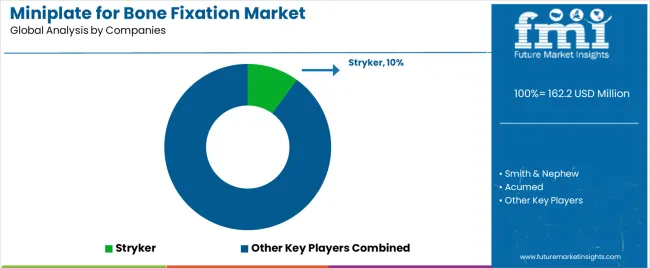
| Items | Details |
|---|---|
| Quantitative Units | USD Million |
| Regions Covered | China, India, Germany, Brazil, U.S., U.K., Japan |
| Plate Type | L-type, T-type, Y-type, Other |
| Application | Craniomaxillofacial Surgery, Neurosurgery, Hand Surgery, Others |
| Key Companies Profiled | Stryker, Smith & Nephew, Acumed, Zimmer Biomet, KLS Martin, Medtronic, TriMed, Sanatmetal, Arthrex, Kanghui Medical, GUANGCI, Jiangsu Hope Medical Instrument, Double Medical, Changzhou Nanxiang Medical Instrument, Jiangsu Angle Medical Devices |
| Additional Attributes | The market analysis includes dollar sales by plate type and application categories. It also covers regional adoption trends across major markets such as China, India, Germany, and the U.S. The competitive landscape features key manufacturers in the medical devices sector, with a focus on innovations in bone fixation technologies. Trends in the increasing demand for miniplates in craniomaxillofacial, neurosurgery, and hand surgeries are highlighted, along with advancements in minimally invasive techniques and titanium-based fixation devices. |
The global miniplate for bone fixation market is estimated to be valued at USD 162.2 million in 2025.
The market size for the miniplate for bone fixation market is projected to reach USD 251.9 million by 2035.
The miniplate for bone fixation market is expected to grow at a 4.5% CAGR between 2025 and 2035.
The key product types in miniplate for bone fixation market are l-type, t-type, y-type and other.
In terms of application, craniomaxillofacial surgery segment to command 35.0% share in the miniplate for bone fixation market in 2025.






Our Research Products

The "Full Research Suite" delivers actionable market intel, deep dives on markets or technologies, so clients act faster, cut risk, and unlock growth.

The Leaderboard benchmarks and ranks top vendors, classifying them as Established Leaders, Leading Challengers, or Disruptors & Challengers.

Locates where complements amplify value and substitutes erode it, forecasting net impact by horizon

We deliver granular, decision-grade intel: market sizing, 5-year forecasts, pricing, adoption, usage, revenue, and operational KPIs—plus competitor tracking, regulation, and value chains—across 60 countries broadly.

Spot the shifts before they hit your P&L. We track inflection points, adoption curves, pricing moves, and ecosystem plays to show where demand is heading, why it is changing, and what to do next across high-growth markets and disruptive tech

Real-time reads of user behavior. We track shifting priorities, perceptions of today’s and next-gen services, and provider experience, then pace how fast tech moves from trial to adoption, blending buyer, consumer, and channel inputs with social signals (#WhySwitch, #UX).

Partner with our analyst team to build a custom report designed around your business priorities. From analysing market trends to assessing competitors or crafting bespoke datasets, we tailor insights to your needs.
Supplier Intelligence
Discovery & Profiling
Capacity & Footprint
Performance & Risk
Compliance & Governance
Commercial Readiness
Who Supplies Whom
Scorecards & Shortlists
Playbooks & Docs
Category Intelligence
Definition & Scope
Demand & Use Cases
Cost Drivers
Market Structure
Supply Chain Map
Trade & Policy
Operating Norms
Deliverables
Buyer Intelligence
Account Basics
Spend & Scope
Procurement Model
Vendor Requirements
Terms & Policies
Entry Strategy
Pain Points & Triggers
Outputs
Pricing Analysis
Benchmarks
Trends
Should-Cost
Indexation
Landed Cost
Commercial Terms
Deliverables
Brand Analysis
Positioning & Value Prop
Share & Presence
Customer Evidence
Go-to-Market
Digital & Reputation
Compliance & Trust
KPIs & Gaps
Outputs
Full Research Suite comprises of:
Market outlook & trends analysis
Interviews & case studies
Strategic recommendations
Vendor profiles & capabilities analysis
5-year forecasts
8 regions and 60+ country-level data splits
Market segment data splits
12 months of continuous data updates
DELIVERED AS:
PDF EXCEL ONLINE
Fork Over Stacker Market Size and Share Forecast Outlook 2025 to 2035
Formaldehyde Removal Air Purifier Market Size and Share Forecast Outlook 2025 to 2035
Fortified Dairy Products Market Size and Share Forecast Outlook 2025 to 2035
Form-Fill-Seal (FFS) Films Market Size and Share Forecast Outlook 2025 to 2035
Formable Films Market Size and Share Forecast Outlook 2025 to 2035
Forchlorfenuron Market Size and Share Forecast Outlook 2025 to 2035
Formalin Market Size and Share Forecast Outlook 2025 to 2035
Formalin Vials Market Size and Share Forecast Outlook 2025 to 2035
Foreign Trade Digital Service Market Size and Share Forecast Outlook 2025 to 2035
Forged and Casting Component Market Size and Share Forecast Outlook 2025 to 2035
Fortified Rice Market Size and Share Forecast Outlook 2025 to 2035
Fortifying Agent Market Size and Share Forecast Outlook 2025 to 2035
Forestry Equipment Market Size and Share Forecast Outlook 2025 to 2035
Forensic Imaging Market Size and Share Forecast Outlook 2025 to 2035
Forklift Battery Market Size and Share Forecast Outlook 2025 to 2035
Formulation Development Outsourcing Market Size and Share Forecast Outlook 2025 to 2035
Forskolin Market Size and Share Forecast Outlook 2025 to 2035
Fortified Milk and Milk Products Market Analysis - Size, Share, & Forecast Outlook 2025 to 2035
Form Fill Seal Equipment Market by Equipment Type from 2025 to 2035
Fortified Eggs Market Analysis - Size, Growth, and Forecast 2025 to 2035

Thank you!
You will receive an email from our Business Development Manager. Please be sure to check your SPAM/JUNK folder too.
Chat With
MaRIA